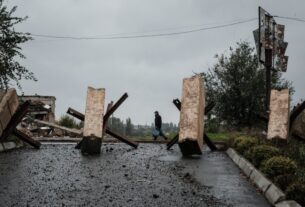ROME – Mario Draghi’s governing coalition is at risk of collapse, as the populist 5Star Movement threatens to quit his government.
The 5Stars, which began as a protest movement, have made numerous compromises since forming a government in 2018. But the movement split over the government’s arming of Ukraine last month.
In recent weeks, tensions have risen between Draghi and Giuseppe Conte, 5Stars’ leader and former prime minister. Conte is under pressure from a coalition of 5Stars lawmakers who think the group can gain support by leaving the government and joining the opposition.
Now, a key vote Thursday on a cost-of-living bill in the Italian parliament will serve as a crucial test to see if Draghi’s coalition survives. The 5Star Movement has been considering whether to boycott the vote on the bill, which Draghi supports and contains €26 billion in measures to help Italians handle inflation and spiking energy costs.
The 5Stars are opposing the bill on environmental grounds, citing provisions to create a new garbage incinerator for Rome.
Draghi has designated the vote a matter of confidence, so a 5Stars’ boycott would effectively signal the group’s withdrawal of support for Draghi’s government. After an initial meeting Wednesday to discuss the matter, the 5Stars’ leadership council had not reached a final decision. Meanwhile, Conte held a call with Draghi as talks continue.
Relations between Italy’s fractious government coalition partners have been increasingly strained in recent weeks. Last week, Conte presented Draghi with a letter saying the 5Stars had suffered “deep political discomfort” from serving in the coalition.
The 5Stars demanded a list of concessions from Draghi, including a minimum wage, an increase in budget expenditures, and guarantees for their flagship policies, such as welfare payments and incentives for the green conversion of homes.
The letter said that the Stars wanted to continue the historic alliances in the EU and NATO, but said Italy was a “passive recipient of decisions made by others” and that this alignment was contributing to “an irreversible fracture”, between the West and the rest of the world.
Draghi on Tuesday said the government’s objectives coincided with some of the 5Stars’ points and announced that the government intended to move towards a kind of minimum wage. But he ruled out an increase in budget expenditures.
“A government does not work with ultimatums, it loses the point of its existence,” Draghi said.
If 5Stars does boycott Thursday’s vote, Draghi will need to speak to Italian President Sergio Mattarella, who could ask him to call a confidence vote to verify if he still has a majority.
ITALY NATIONAL PARLIAMENT ELECTION POLL OF POLLS
For more polling data from across Europe visit POLITICO Poll of Polls.
Technically, Draghi could still command a majority without the 5Stars. But he has indicated repeatedly that if the 5Stars pull out, he will not be available to lead another government. The right-wing League party also indicated on Wednesday that it would not take part in another government. That would potentially leave Italy facing early elections.
Analysts said elections before 2023 are unlikely, as Italy has never had elections in the autumn, when the government needs to prepare and pass its budget.
Giovanni Orsina, a professor of political history at Luiss University in Rome said a solution is likely to be found as no one wants the responsibility of bringing down the government “in the middle of a pandemic, war, drought, looming energy crisis and with the budget law to write.”
One alternative scenario is that the 5Stars decides to vote with the government on Thursday and delay a decision on leaving the government in the hope of gaining more concessions from Draghi.
Orsina said that if the 5Stars does refuse to vote, Draghi could ultimately remain out of a sense of duty to the country: “If Mattarella asks him to stay on in the interest of the country, and he has a majority, it would be difficult for a civil servant to say ‘No.’ There is a country to be governed.”




